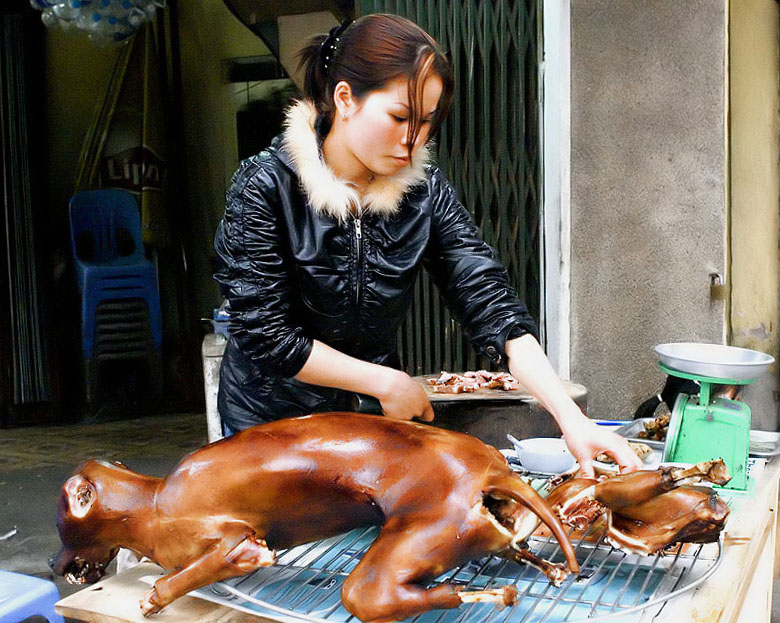It was a come-and-meet-a- real-live Canadian event when I first met Amy in Kansas in 2005, and when I first told her that sleeping with her dog was a microbiological risk.
I also told her French food was overrated and she shouldn’t eat rare hamburgers.
.jpg) She asked me out on a date.
She asked me out on a date.
In a study to be published in Emerging Infectious Diseases, veterinary scientists say sleeping with your pets increases the chances of contracting everything from parasites to the plague.
Andrew Schneider of AOL News reports most U.S. households have pets, and more than half of those cats and dogs are allowed to sleep in their owner’s beds.
Personal note: our dogs do not sleep in the bed, but the cats do, primarily in the winter when it’s too cold to go outside; in the summer we are of no use and the cats can disappear for days.
Drs. Bruno Chomel, a professor at the University of California, Davis, School of Veterinary Medicine, and Ben Sun, chief veterinarian for California’s Department of Health, say they .jpg) wanted to raise the attention of people, as sleeping with a pet is becoming quite common, and there are risks associated with it, even if it is not very frequent.
wanted to raise the attention of people, as sleeping with a pet is becoming quite common, and there are risks associated with it, even if it is not very frequent.
The authors found that "the risk for transmission of zoonotic agents by close contact between pets and their owners through bed sharing, kissing or licking is real and has even been documented for life-threatening infections such as plague, internal parasites" and other serious diseases.
This study and several others show that disease from cats is far more prevalent, and often more serious.
The number of cats snuggling up with their owner is far greater, which may explain the larger number of people acquiring feline-spawned diseases, Chomel explained.
Sharing our resting hours with our pets may be a source of psychological comfort, but because pets can bring a wide range of zoonotic pathogens into our environment, sharing is also associated with risks, the authors of the current study reported.
• A 9-year-old boy from Arizona got the plague because he slept with his flea-infested cat.
• A 48-year-old man and his wife repeatedly contracted MRSA (methicillin-resistant Staphylococcus aureus), which their physicians eventually attributed to their dog. The .jpg) animal "routinely slept in their bed and frequently licked their face," the California experts reported.
animal "routinely slept in their bed and frequently licked their face," the California experts reported.
• A Japanese woman contacted meningitis after kissing her pet’s face.
• A study published last August in the journal Pediatrics tracked an outbreak of salmonella in 79 people between 2006 and 2008 that was caused by contaminated meat in dry cat and dog food.
Half of the victims were children, who CDC investigators said "might also have played with the pet food and then put their hands — or the food itself — in their mouths."

 discovered at Maddux Park. The sand play areas at both parks are being replaced with water features, officials said, and the renovations should be done by mid-January.
discovered at Maddux Park. The sand play areas at both parks are being replaced with water features, officials said, and the renovations should be done by mid-January. cooking oil, peppers, and salt. Korkuc told authorities that his pet feline was "possessive, greedy, and wasteful" and that he intended to cook and eat it. Korkuc has been charged with animal cruelty. …
cooking oil, peppers, and salt. Korkuc told authorities that his pet feline was "possessive, greedy, and wasteful" and that he intended to cook and eat it. Korkuc has been charged with animal cruelty. … see below; this song by Calgary’s Loverboy came on the radio while driving back from Nebraska and Phebus said he liked it; there’s no accounting for taste).
see below; this song by Calgary’s Loverboy came on the radio while driving back from Nebraska and Phebus said he liked it; there’s no accounting for taste). ANSA.it is reporting
ANSA.it is reporting The Times of London reports that a proposed law calls for imposing fines, jail time or both for anyone caught eating or selling dog or cat meat. Dog meat is also known as “fragrant meat” and is thought to boost energy and male virility. It’s also a delicacy.
The Times of London reports that a proposed law calls for imposing fines, jail time or both for anyone caught eating or selling dog or cat meat. Dog meat is also known as “fragrant meat” and is thought to boost energy and male virility. It’s also a delicacy.